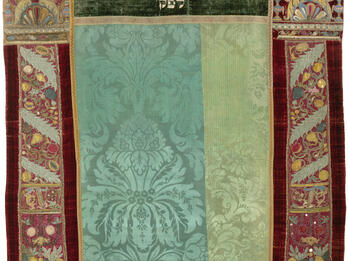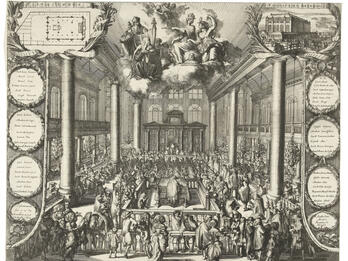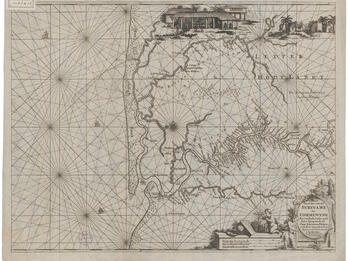Takkanot Fez (Regulations of Fez): On Moderating Celebrations
Regulations against Extravagant Parties
When we were gathered together, we the undersigned, to negotiate the repair of fissures in our city, which is the renowned Fez, with the advice and consent of our rabbis, the wholly wise men, the sages of the city [ . . . ] with the advice and consent of our lord, the exalted leader his honor rabbi Jacob Roti, may the Merciful One guard him and redeem him, we saw that many fine people have become impoverished, while the rest of the people have been shaken and become poorer. This is due to the many taxes and levies that have been piled on the communities. [ . . . ] In addition, there is a waste of money as people have become accustomed to dishing out funds on days of festivity and joy so that rich and poor can celebrate together. [ . . . ]
Only One Single Feast Is Permitted for Any Festivity: Betrothal, Wedding, Circumcision, Redeeming of the First Born
Therefore, we have seen fit to ordain, regarding every son of Israel who lives in our city who holds a feast for whatever type of festive occasion and joy he might have. This applies to betrothal feasts held in the home of the fiancée, wedding feasts taking place in the home of the groom, as well as feasts for the performance of a circumcision, or the commandment of redeeming the first born. The host should hold only a single feast for that festive occasion. [ . . . ] And to that first feast itself, he should invite only the family relations of the betrothed woman and man, or the married bride and groom, or the father of the son and the father of the firstborn and their mother, even if they amount to more than ten. If those relatives do not come to a total of ten, he is permitted to add outsiders, but only to reach the sum of ten.
Only Close Family Members May Be Invited to the Feast of the Betrothed Man in the House of the Fiancée
For the first feast held in honor of a betrothed man in the home of his fiancée, which is called dakhlā’ [entry] by the multitude, they should invite only the betrothed man, his father, and his brothers. [ . . . ]
Only Close Relatives May Be Invited to the Feast for the Shaving of the Groom and Other Such Feasts, Such as Sending the Ḥīāniyā’ [Henna] from the Groom to the Bride. Likewise, the Amount of Food Must Be Restricted
At the feast that includes all sorts of delicacies and beverages, which a groom is accustomed to make on the day when he is shaved in honor of his wedding, he shall invite to that feast only those close to the family of the groom and bride. If they do not amount to ten, he is permitted to add only enough to complete ten. In addition, the groom and the members of his household do not have permission to invite women to make al-‘iqāda [a kind of cake] and al-ka‘āk [biscuits], which are prepared from a mixture of things for his wedding, except for his mother and the mother of the bride, and their sisters. If they do not amount to ten, he is permitted to add women to them from outside, but only to reach the number of ten women. [ . . . ]
Festivities Merely in Celebration of the Purchase of an Apartment or Banquets for Tying the Groom in a White Cloth Must Be Canceled
We also saw fit to ordain that one should not make a taqyīāl [celebration] for any reason, any kind of celebration of rejoicing and festivity, for the sons of the covenant who dwell in this city; nor shall they hold a feast on the Sabbath day before the wedding in honor of the wedding, neither in the home of the bride nor in the home of the groom. This applies even to the banquet held for the best men in the evening, which is called qā‘a by the multitude. Nor shall the groom hold a rabatah banquet during the days of the wedding, which people are accustomed to make.
A Meal of Fish Shall Not Be Served on the Day the Groom Leaves His Bridal Canopy
Furthermore, the groom may not make a meal of fish and other kinds of food, even for his best men on the day he leaves the bridal canopy, but only what is needed for the members of his household. Nor may he send the gift called meriyenda [sweet snacks] to the home of the bride on the Sabbath before the wedding. Likewise, the betrothed man may not send a gift to the home of his fiancée on the ninth of Av or on the tenth of Av, nor on the day his fiancée lets blood. Nor may he invite his friends and his beloved ones to the home of his fiancée on the day when she lets blood; nor may the groom send al-ḥīāniyā’ to the bride’s house for the needs of the wedding, except by the hand of one woman, and he may not send a gift of delicacies and beverages, except for butter and honey. [ . . . ]
Not to Send Gifts of Kinds of Foods, Meats, and Cakes to the Home of a Woman Who Has Given Birth during the Week of the Birth
We have also seen fit to ordain that one should not send a gift of types of food and cakes to the home of a woman who has given birth during the week of the birth, either on weekdays or the Sabbath, except those related to the new mother and her husband.
Covering the Hair of the Bride
They also ordained that the bride’s hair should be covered with a garment of silk, after she is married, and she shall not go to the groom’s house, even with her hair covered, until the stars are out. [ . . . ]
We have accepted upon ourselves all the aforementioned items by an oath to the blessed Lord to observe and fulfill, from this day for a period of ten years. Anyone who—perish the thought—violates any detail, aside from his being punished as a delinquent before the court and the leader as they see fit, he will be separated from the congregation of Israel for all matters of sanctity, he will pay a fine which will be used for the benefit of the congregation. [ . . . ]
As proof that we have agreed and sworn to observe the conditions in the aforementioned manner, we have signed here, with the agreement and permission of our rabbis and our leader.
Credits
Published in: The Posen Library of Jewish Culture and Civilization, vol. 5.





